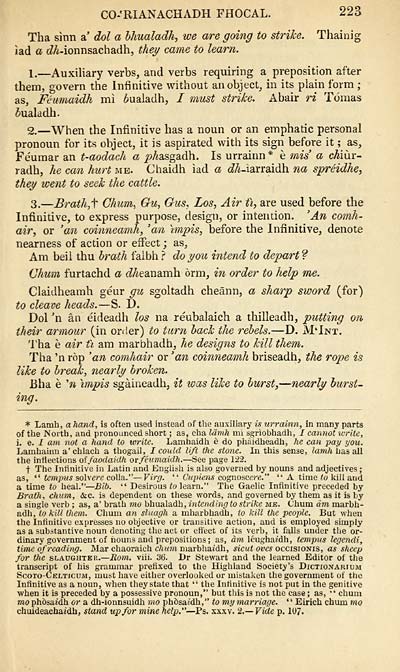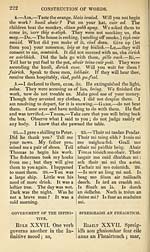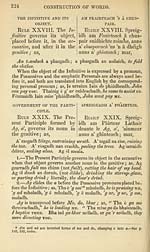Books and other items printed in Gaelic from 1841 to 1870 > Stéidhean a' Ghràmair Ghaëlig
(251) Page 223
Download files
Complete book:
Individual page:
Thumbnail gallery: Grid view | List view

CO-'RIANACHADH FHOCAL.
223
Tha sìnn a' dol a òhualadh, we are going to strihe. Thainig
ìad a c?/*-ionnsachadh, they came to learn.
L — Auxiliary verbs, and verbs requiring a preposition after
them, govern the Infinitive without anobject, in its plain form ;
as, Fèumaidh mì èualadh, / must strike. Abair ri Tòmas
òualadh.
2. — When the Infinitive has a noun or an emphatic personal
pronoun for its object, it is aspirated with its sign before it ; as,
Fèumar an t-aodach a ^Aasgadh. Is urrainn * è mis' a cAiùr-
radh, he can hurt me. Chaidh ìad a JA-ìarraidh na sprèidhe,
they went to seek the cattle.
3, — Brath,f Chum, Gu, Gus, Los, Air ti, are used before the
Infinitive, to express purpose, design, or intention. ' An comh-
air, or 'an coinneamh, 'an impis, before the Infinitive, denote
nearness of action or effect ; as,
Am beil thu brath faibh ? do you intend to depart ?
Chum furtachd a dhe&namh òrm, in order to help me.
Claidheamh gèur gu sgoltadh cheànn, a sharp sword (for)
to cleave heads. — S. D.
Dol 'n àn èideadh los na rèubalaich a thilleadh, putting on
their armour (in order) to turn back the rebels. — D. M'Int.
Tha è air tì am marbhadh, he designs to kill them.
Tha 'n ròp 'an comhair or 'an coinneamh briseadh, the rope is
like to break, nearly broken.
Bha è '» impis sgàineadh, it was like to burst, — nearly burst-
* Lamh, a hand, is often used instead of the auxiliary is urrainn, in manj' parts
of the JNorth, and pronounced short ; as, cha làmli mì sgrìobhadh, / cannot write,
i. e. I am not a liand to write. Lamhaidh è do phàidheadh, he can pay you.
Lamhainn a' chlach a thogail, I could lìft the stone. In this sense, lamh has all
the inflections oifaodaklh or fèumaidh. — See page 122.
f The Intìnitive in Latin and English is also governed by nouns and adjectives ;
as, " tempus sohere co\\à."—Virg. " Cupiens cognosce?-e." " A time to kill and
a time to heal." — Bib. " Desirous to learn." The Gaelic Infinitive preceded by
Brath, chum, &c. is dependent on these words, and governed by them as it is by
a single verb ; as, a' brath mo bhualadh, intending to strike me. (Jhum àm marbh-
adh, to kill them. Chum an sluagh a mharbhadh, to kill the people. But when
the Infinitive expresses no objective or transitive action, and is employed simply
as a substantive noun denoting the act or etìect of its verb, it falls under the or-
dinary government of nouns and prepositions ; as, àm lèughatàh, tempus legendi,
time of reading. Mar chaoraich chum marbhatdh, sicut ovcs occisionis, as sheep
for the slaughter. — Rom. viii. 36. Dr Stewart and the learned Editor of the
transcript of his grammar prefixed to the Highland Society's Dictionarium
Scoto-Cjelticum, must have either overlooked or mistaken the government of the
Infinitive as a noun, when they state that " the Infinitive is not put in the genitive
when it is preceded by a possessive pronoun," but this is not the case ; as, " chum
mo phòsai'dh or a dh-ionnsuidh mo phòsad'dh," to my marriage. ' ' Eirich chum mo
chuideachai'dhj stand upfor mine help."—Ps. xxxv. 2.— Vkle p. 107.
223
Tha sìnn a' dol a òhualadh, we are going to strihe. Thainig
ìad a c?/*-ionnsachadh, they came to learn.
L — Auxiliary verbs, and verbs requiring a preposition after
them, govern the Infinitive without anobject, in its plain form ;
as, Fèumaidh mì èualadh, / must strike. Abair ri Tòmas
òualadh.
2. — When the Infinitive has a noun or an emphatic personal
pronoun for its object, it is aspirated with its sign before it ; as,
Fèumar an t-aodach a ^Aasgadh. Is urrainn * è mis' a cAiùr-
radh, he can hurt me. Chaidh ìad a JA-ìarraidh na sprèidhe,
they went to seek the cattle.
3, — Brath,f Chum, Gu, Gus, Los, Air ti, are used before the
Infinitive, to express purpose, design, or intention. ' An comh-
air, or 'an coinneamh, 'an impis, before the Infinitive, denote
nearness of action or effect ; as,
Am beil thu brath faibh ? do you intend to depart ?
Chum furtachd a dhe&namh òrm, in order to help me.
Claidheamh gèur gu sgoltadh cheànn, a sharp sword (for)
to cleave heads. — S. D.
Dol 'n àn èideadh los na rèubalaich a thilleadh, putting on
their armour (in order) to turn back the rebels. — D. M'Int.
Tha è air tì am marbhadh, he designs to kill them.
Tha 'n ròp 'an comhair or 'an coinneamh briseadh, the rope is
like to break, nearly broken.
Bha è '» impis sgàineadh, it was like to burst, — nearly burst-
* Lamh, a hand, is often used instead of the auxiliary is urrainn, in manj' parts
of the JNorth, and pronounced short ; as, cha làmli mì sgrìobhadh, / cannot write,
i. e. I am not a liand to write. Lamhaidh è do phàidheadh, he can pay you.
Lamhainn a' chlach a thogail, I could lìft the stone. In this sense, lamh has all
the inflections oifaodaklh or fèumaidh. — See page 122.
f The Intìnitive in Latin and English is also governed by nouns and adjectives ;
as, " tempus sohere co\\à."—Virg. " Cupiens cognosce?-e." " A time to kill and
a time to heal." — Bib. " Desirous to learn." The Gaelic Infinitive preceded by
Brath, chum, &c. is dependent on these words, and governed by them as it is by
a single verb ; as, a' brath mo bhualadh, intending to strike me. (Jhum àm marbh-
adh, to kill them. Chum an sluagh a mharbhadh, to kill the people. But when
the Infinitive expresses no objective or transitive action, and is employed simply
as a substantive noun denoting the act or etìect of its verb, it falls under the or-
dinary government of nouns and prepositions ; as, àm lèughatàh, tempus legendi,
time of reading. Mar chaoraich chum marbhatdh, sicut ovcs occisionis, as sheep
for the slaughter. — Rom. viii. 36. Dr Stewart and the learned Editor of the
transcript of his grammar prefixed to the Highland Society's Dictionarium
Scoto-Cjelticum, must have either overlooked or mistaken the government of the
Infinitive as a noun, when they state that " the Infinitive is not put in the genitive
when it is preceded by a possessive pronoun," but this is not the case ; as, " chum
mo phòsai'dh or a dh-ionnsuidh mo phòsad'dh," to my marriage. ' ' Eirich chum mo
chuideachai'dhj stand upfor mine help."—Ps. xxxv. 2.— Vkle p. 107.
Set display mode to:
![]() Universal Viewer |
Universal Viewer | ![]() Mirador |
Large image | Transcription
Mirador |
Large image | Transcription
Images and transcriptions on this page, including medium image downloads, may be used under the Creative Commons Attribution 4.0 International Licence unless otherwise stated. ![]()
| Rare items in Gaelic > Books and other items printed in Gaelic from 1841 to 1870 > Stéidhean a' Ghràmair Ghaëlig > (251) Page 223 |
|---|
| Permanent URL | https://digital.nls.uk/101714611 |
|---|
| Description | Out-of-copyright books printed in Gaelic between 1631 and 1900. Also some pamphlets and chapbooks. Includes poetry and songs, religious books such as catechisms and hymns, and different editions of the Bible and the Psalms. Also includes the second book ever published in Gaelic in 1631. |
|---|

